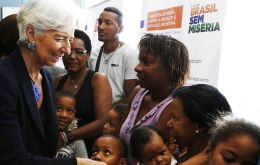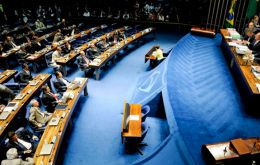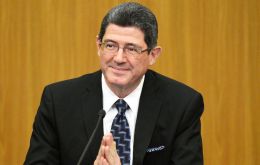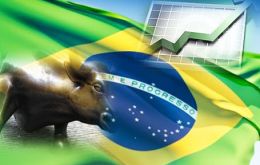MercoPress. South Atlantic News Agency
Tag: Brazil economy
-
Saturday, May 30th 2015 - 09:46 UTC
Brazilian unions hold rallies in main cities to protest austerity measures

Brazilian unions held nationwide protests Friday against the federal government's austerity measures and a bill that would allow companies to outsource any part of their operations. unions held rallies in 23 of Brazil's 27 states to protest the outsourcing proposal and a separate bill that would restrict access to unemployment insurance, both of which are nearing full legislative approval.
-
Friday, May 22nd 2015 - 08:16 UTC
Brazil heading for full recession: economic activity down, unemployment up

Economic activity in Brazil tumbled in the first quarter and unemployment climbed to a near four-year high, adding to signals that a looming recession could worsen as President Dilma Rousseff reins in public spending.
-
Friday, May 22nd 2015 - 05:42 UTC
Lagarde preaches fiscal discipline in one of Brazil's most dangerous slums

The head of the International Monetary Fund (IMF) encouraged Brazil on Thursday to pursue fiscal discipline, saying it was needed to protect social programs benefitting the poorest members of society. IMF chief Christine Lagarde made the link during a visit to Complexo do Alemao, one of Rio's largest and most dangerous slums and an example of the challenges the country faces as it struggles with low growth and high inflation
-
Saturday, May 16th 2015 - 07:58 UTC
Congress upsets Rousseff: votes to boost pension benefits

Brazilian President Dilma Rousseff saw allies and members of her own Workers’ Party challenge her in Congress by voting in favor of boosting pension benefits.
-
Saturday, May 16th 2015 - 07:46 UTC
Levy tries to convince investors in London that Brazil slowdown is temporary

Brazilian Finance Minister Joaquim Levy said he expected the country’s economic slowdown to be temporary and that fiscal discipline remained central to ensuring the recovery as a commodity price boom waned. Addressing investors in London, Levy said fiscal discipline was needed to cushion the economy against the inflationary effects of the falling Real currency.
-
Thursday, May 14th 2015 - 07:30 UTC
Brazil's austerity measures to balance the budget start moving in Congress

Brazil's Congress Lower House passed a bill on Wednesday toughening access to social security pensions, the second measure approved in a week to cut benefits in a drive to reduce a growing fiscal deficit.
-
Monday, May 11th 2015 - 10:11 UTC
Brazil's inflation eases in April but still well above central bank's target

Brazil's consumer price inflation slowed in April, but not enough to prevent the 12-month rate from remaining well above the central bank's target. The consumer-price index, IPCA, rose 0.71% in April, compared with a rise of 1.32% in March, the Brazilian Institute of Geography and Statistics, or IBGE, said in its latest release.
-
Thursday, May 7th 2015 - 06:08 UTC
Brazil's industrial production continues to skid, 4,7% in twelve months

Brazil's industrial production has dropped 4.7% in the last twelve months after slipping in March by 0.8% amid a sharp downturn in the country's economy, official figures showed Wednesday.
-
Tuesday, April 28th 2015 - 05:44 UTC
Brazil's economy expected to further contract and inflation to reach 8.25%

Analysts have reviewed negatively Brazil's 2015 inflation and growth forecasts, according to the latest Focus report from the Central Bank, released on Monday. The survey which includes 100 analysts from private financial institutions on the state of the economy anticipates inflation of 8.25% and 1.1% contraction of GDP by the end of the year.
-
Wednesday, April 22nd 2015 - 06:03 UTC
Understanding the drivers of prosperity in Latin America and the Caribbean

A new World Bank Group report, “Shared Prosperity and Poverty Eradication in Latin America and the Caribbean”, explores the performance of eight countries to understand what has driven progress, and what it will take to sustain it.
